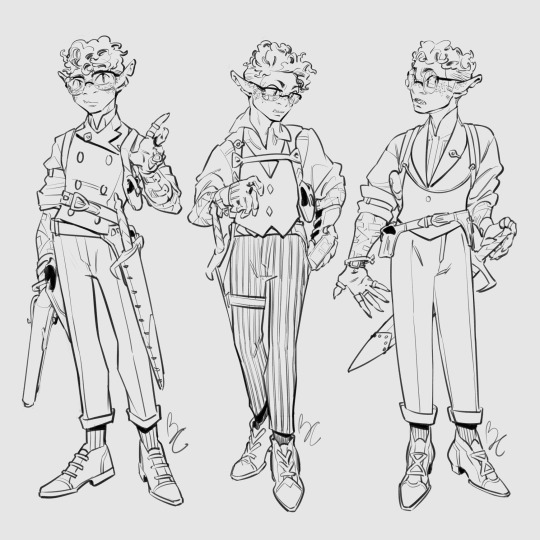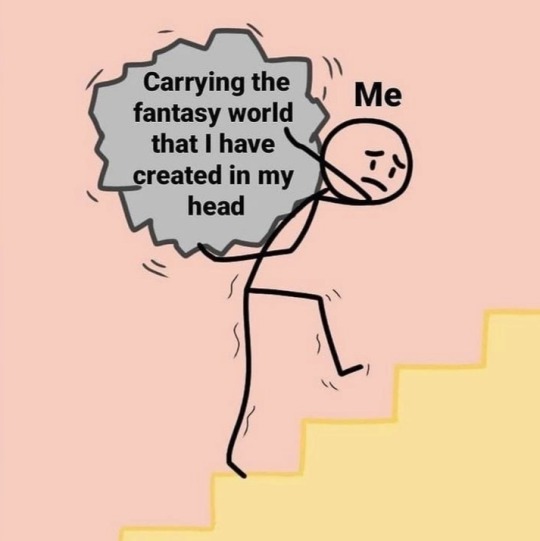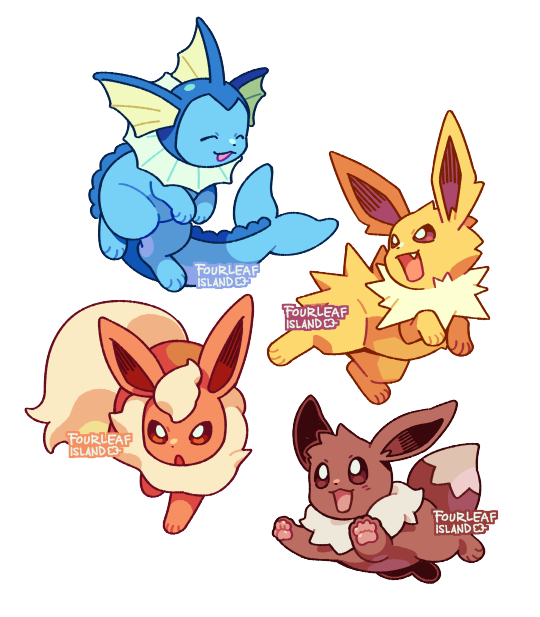Text
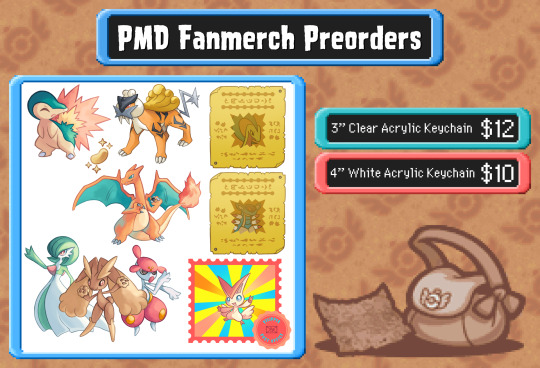
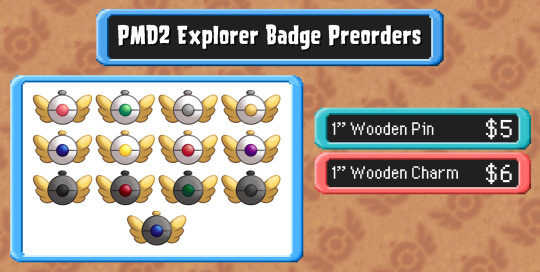

Opening preorders for a new batch of custom Pokémon & PMD pins and keychains. Preorders close on May 15th; expand post for information ⬇️
★ Preorders close on May 15th at 8:00PM EST. Once preorders close, the manufacturing order will be placed within 48 hours.
★ Payment will be collected via PayPal invoice after the order has been placed. Invoices must be paid in full within 4 days.
★ Shipping within the Unites States is a flat $4.50. International shipping is $9-$12+.
★ Items will be manufactured in China and shipped from the US. The entire manufacturing process (from order placement to arrival) typically takes 1-2 months.
★ All merch designs in the first two images are customizable; choose the design(s) you'd like from the lineup and pick the type of merchandise you'd like to have it made into.
★ As a result of the manufacturing process, most wooden wanted poster 3D pins will have mild to moderate scratches and/or imperfections in the wood. Most of these imperfections are only visible upon close inspection under direct light.
★ Preorder customers may either choose their pin clutch/keychain clasp (options shown below), or delegate the decision to me.
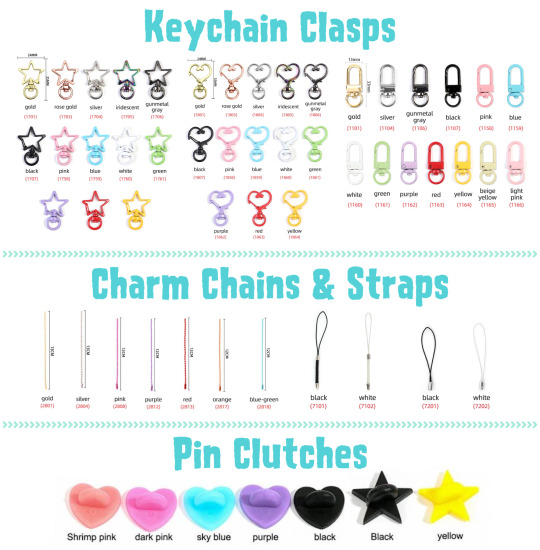
51 notes
·
View notes
Text
Yeah you're right. It WOULD be pretty fucked up if you were a swan but you were raised by ducks and you grew up never seeing another swan or even knowing that such a thing as a swan even existed so you just thought you were a duck with something super wrong with it.
323K notes
·
View notes
Text
Being a young adult is so strange. You enter a coffee shop. The 20 year old girl waiting behind you cried all night because she just came to a new city for university and she feels so alone. That 27 year old guy over there works a job he is overqualified for, he lives with his parents and wants to move out but doesn't know what to do about it. That one 24 year old dude already has a car, a house, and a job waiting for him once he graduates thanks to his dad's connections. The 26 year old barista couldn't complete his higher education because he has to work and take care of his family. The 28 year old girl sitting next to you has no friends to go out with so she is texting her mother. That couple (both 25 years old) are married and the girl is pregnant. The 29 year old writing something on her laptop has realized that she chose the wrong major so she is trying to start all over. We are not alone in this, but we are actually so alone. Do you feel me
45K notes
·
View notes
Text
i just gotta have my weekly “i am frustrated w employed people” moment. because i just feel so isolated in every conversation, i feel envious of their income and ability to live an independent life and buy things. if thats u I truly do need you to recognize and be conscientious of the fact that even though there is much wrong with the environment and expectations of employment, still that it is a privilege to be able to participate in it, because it means you at least have that base level of worth to society so that you can participate in it as designed. ppl like me cannot.
#thank you#ive come to hate hanging out with my own friends#cause they all have jobs#and i live online and cant go outside#or get regular employment#so im a vtuber&artist for a living#and it sucks#tori-reblog
2K notes
·
View notes
Text

Let trans kids become trans adults 🩵🏳️⚧️🩷
1K notes
·
View notes
Text
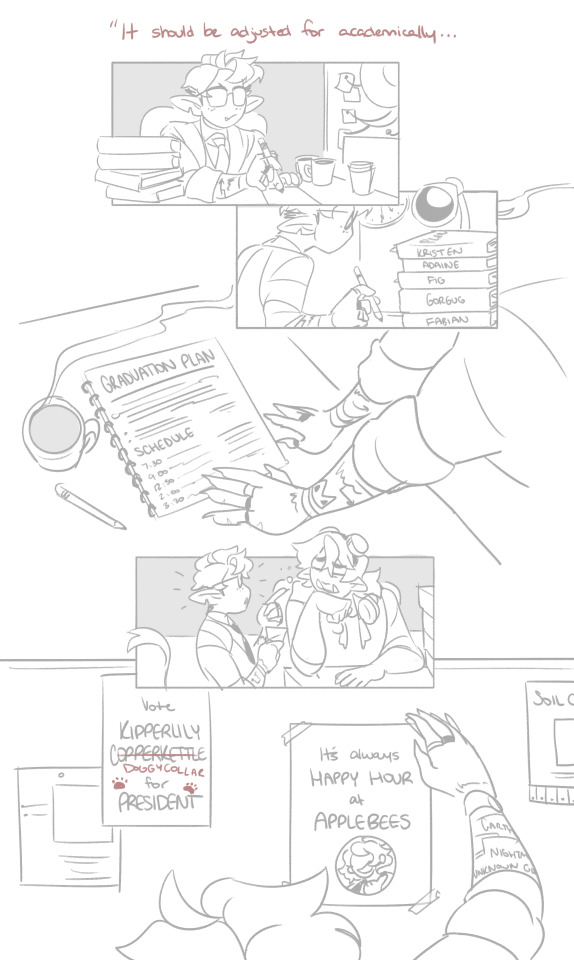
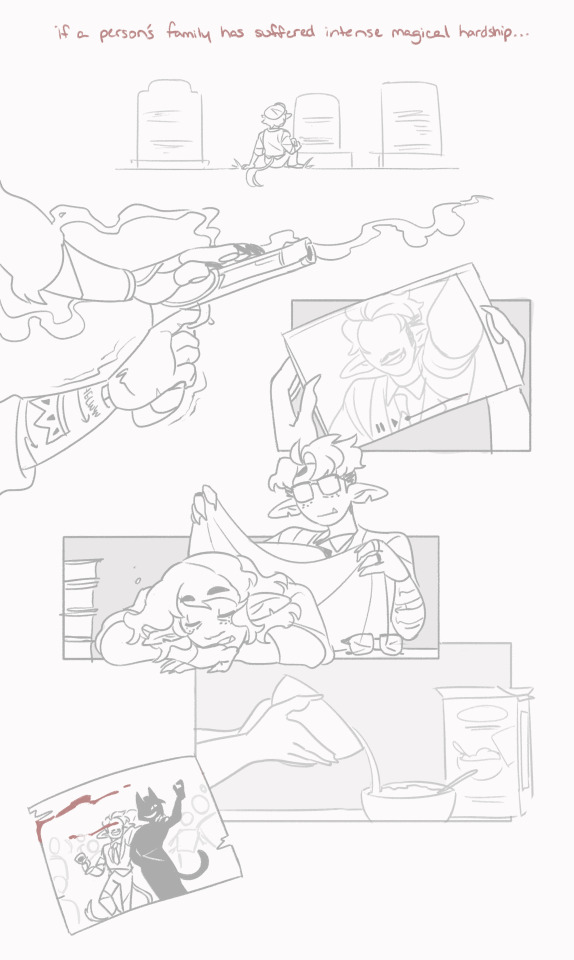
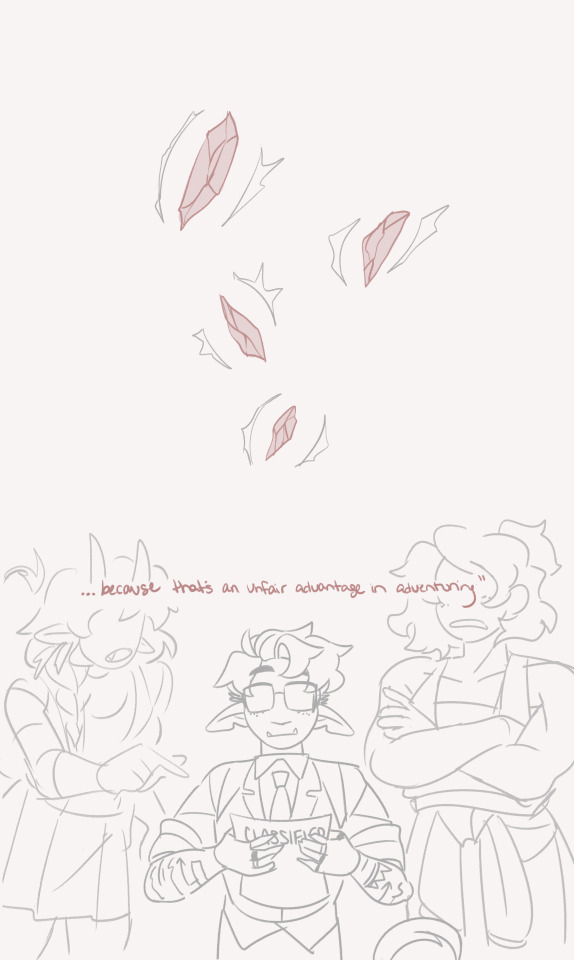
i couldn't rest until i made something this is driving me insane. so what if i dismissed your success as because of your hardships instead of in spite of them
3K notes
·
View notes
Text

another deranged drawing from my demented mind
48K notes
·
View notes
Text

WATCH THIS VIDEO
a very, VERY important post. spread everywhere and screen record the video to your phone. or message me and ill happily send you the video. give to every woman and girl you know.
bc as they both said / demonstrated, its not only super easy to do, but super easy to miss.
90K notes
·
View notes
Text
here’s a story about changelings
reposted from my old blog, which got deleted:
Mary was a beautiful baby, sweet and affectionate, but by the time she’s three she’s turned difficult and strange, with fey moods and a stubborn mouth that screams and bites but never says mama. But her mother’s well-used to hard work with little thanks, and when the village gossips wag their tongues she just shrugs, and pulls her difficult child away from their precious, perfect blossoms, before the bites draw blood. Mary’s mother doesn’t drown her in a bucket of saltwater, and she doesn’t take up the silver knife the wife of the village priest leaves out for her one Sunday brunch.
She gives her daughter yarn, instead, and instead of a rowan stake through her inhuman heart she gives her a child’s first loom, oak and ash. She lets her vicious, uncooperative fairy daughter entertain herself with games of her own devising, in as much peace and comfort as either of them can manage.
Mary grows up strangely, as a strange child would, learning everything in all the wrong order, and biting a great deal more than she should. But she also learns to weave, and takes to it with a grand passion. Soon enough she knows more than her mother–which isn’t all that much–and is striking out into unknown territory, turning out odd new knots and weaves, patterns as complex as spiderwebs and spellrings.
“Aren’t you clever,” her mother says, of her work, and leaves her to her wool and flax and whatnot. Mary’s not biting anymore, and she smiles more than she frowns, and that’s about as much, her mother figures, as anyone should hope for from their child.
Mary still cries sometimes, when the other girls reject her for her strange graces, her odd slow way of talking, her restless reaching fluttering hands that have learned to spin but never to settle. The other girls call her freak, witchblood, hobgoblin.
“I don’t remember girls being quite so stupid when I was that age,” her mother says, brushing Mary’s hair smooth and steady like they’ve both learned to enjoy, smooth as a skein of silk. “Time was, you knew not to insult anyone you might need to flatter later. ‘Specially when you don’t know if they’re going to grow wings or horns or whatnot. Serve ‘em all right if you ever figure out curses.”
“I want to go back,” Mary says. “I want to go home, to where I came from, where there’s people like me. If I’m a fairy’s child I should be in fairyland, and no one would call me a freak.”
“Aye, well, I’d miss you though,” her mother says. “And I expect there’s stupid folk everywhere, even in fairyland. Cruel folk, too. You just have to make the best of things where you are, being my child instead.”
Mary learns to read well enough, in between the weaving, especially when her mother tracks down the traveling booktraders and comes home with slim, precious manuals on dyes and stains and mordants, on pigments and patterns, diagrams too arcane for her own eyes but which make her daughter’s eyes shine.
“We need an herb garden,” her daughter says, hands busy, flipping from page to page, pulling on her hair, twisting in her skirt, itching for a project. “Yarrow, and madder, and woad and weld…”
“Well, start digging,” her mother says. “Won’t do you a harm to get out of the house now’n then.”
Mary doesn’t like dirt but she’s learned determination well enough from her mother. She digs and digs, and plants what she’s given, and the first year doesn’t turn out so well but the second’s better, and by the third a cauldron’s always simmering something over the fire, and Mary’s taking in orders from girls five years older or more, turning out vivid bolts and spools and skeins of red and gold and blue, restless fingers dancing like they’ve summoned down the rainbow. Her mother figures she probably has.
“Just as well you never got the hang of curses,” she says, admiring her bright new skirts. “I like this sort of trick a lot better.”
Mary smiles, rocking back and forth on her heels, fingers already fluttering to find the next project.
She finally grows up tall and fair, if a bit stooped and squinty, and time and age seem to calm her unhappy mouth about as well as it does for human children. Word gets around she never lies or breaks a bargain, and if the first seems odd for a fairy’s child then the second one seems fit enough. The undyed stacks of taken orders grow taller, the dyed lots of filled orders grow brighter, the loom in the corner for Mary’s own creations grows stranger and more complex. Mary’s hands callus just like her mother’s, become as strong and tough and smooth as the oak and ash of her needles and frames, though they never fall still.
“Do you ever wonder what your real daughter would be like?” the priest’s wife asks, once.
Mary’s mother snorts. “She wouldn’t be worth a damn at weaving,” she says. “Lord knows I never was. No, I’ll keep what I’ve been given and thank the givers kindly. It was a fair enough trade for me. Good day, ma’am.”
Mary brings her mother sweet chamomile tea, that night, and a warm shawl in all the colors of a garden, and a hairbrush. In the morning, the priest’s son comes round, with payment for his mother’s pretty new dress and a shy smile just for Mary. He thinks her hair is nice, and her hands are even nicer, vibrant in their strength and skill and endless motion.
They all live happily ever after.
*
Here’s another story:
Gregor grew fast, even for a boy, grew tall and big and healthy and began shoving his older siblings around early. He was blunt and strange and flew into rages over odd things, over the taste of his porridge or the scratch of his shirt, over the sound of rain hammering on the roof, over being touched when he didn’t expect it and sometimes even when he did. He never wore shoes if he could help it and he could tell you the number of nails in the floorboards without looking, and his favorite thing was to sit in the pantry and run his hands through the bags of dry barley and corn and oat. Considering as how he had fists like a young ox by the time he was five, his family left him to it.
“He’s a changeling,” his father said to his wife, expecting an argument, but men are often the last to know anything about their children, and his wife only shrugged and nodded, like the matter was already settled, and that was that.
They didn’t bind Gregor in iron and leave him in the woods for his own kind to take back. They didn’t dig him a grave and load him into it early. They worked out what made Gregor angry, in much the same way they figured out the personal constellations of emotion for each of their other sons, and when spring came, Gregor’s father taught him about sprouts, and when autumn came, Gregor’s father taught him about sheaves. Meanwhile his mother didn’t mind his quiet company around the house, the way he always knew where she’d left the kettle, or the mending, because she was forgetful and he never missed a detail.
“Pity you’re not a girl, you’d never drop a stitch of knitting,” she tells Gregor, in the winter, watching him shell peas. His brothers wrestle and yell before the hearth fire, but her fairy child just works quietly, turning peas by their threes and fours into the bowl.
“You know exactly how many you’ve got there, don’t you?” she says.
“Six hundred and thirteen,” he says, in his quiet, precise way.
His mother says “Very good,” and never says Pity you’re not human. He smiles just like one, if not for quite the same reasons.
The next autumn he’s seven, a lucky number that pleases him immensely, and his father takes him along to the mill with the grain.
“What you got there?” The miller asks them.
“Sixty measures of Prince barley, thirty two measures of Hare’s Ear corn, and eighteen of Abernathy Blue Slate oats,” Gregor says. “Total weight is three hundred fifty pounds, or near enough. Our horse is named Madam. The wagon doesn’t have a name. I’m Gregor.”
“My son,” his father says. “The changeling one.”
“Bit sharper’n your others, ain’t he?” the miller says, and his father laughs.
Gregor feels proud and excited and shy, and it dries up all his words, sticks them in his throat. The mill is overwhelming, but the miller is kind, and tells him the name of each and every part when he points at it, and the names of all the grain in all the bags waiting for him to get to them.
“Didn’t know the fair folk were much for machinery,” the miller says.
Gregor shrugs. “I like seeds,” he says, each word shelled out with careful concentration. “And names. And numbers.”
“Aye, well. Suppose that’d do it. Want t’help me load up the grist?”
They leave the grain with the miller, who tells Gregor’s father to bring him back ‘round when he comes to pick up the cornflour and cracked barley and rolled oats. Gregor falls asleep in the nameless wagon on the way back, and when he wakes up he goes right back to the pantry, where the rest of the seeds are left, and he runs his hands through the shifting, soothing textures and thinks about turning wheels, about windspeed and counterweights.
When he’s twelve–another lucky number–he goes to live in the mill with the miller, and he never leaves, and he lives happily ever after.
*
Here’s another:
James is a small boy who likes animals much more than people, which doesn’t bother his parents overmuch, as someone needs to watch the sheep and make the sheepdogs mind. James learns the whistles and calls along with the lambs and puppies, and by the time he’s six he’s out all day, tending to the flock. His dad gives him a knife and his mom gives him a knapsack, and the sheepdogs give him doggy kisses and the sheep don’t give him too much trouble, considering.
“It’s not right for a boy to have so few complaints,” his mother says, once, when he’s about eight.
“Probably ain’t right for his parents to have so few complaints about their boy, neither,” his dad says.
That’s about the end of it. James’ parents aren’t very talkative, either. They live the routines of a farm, up at dawn and down by dusk, clucking softly to the chickens and calling harshly to the goats, and James grows up slow but happy.
When James is eleven, he’s sent to school, because he’s going to be a man and a man should know his numbers. He gets in fights for the first time in his life, unused to peers with two legs and loud mouths and quick fists. He doesn’t like the feel of slate and chalk against his fingers, or the harsh bite of a wooden bench against his legs. He doesn’t like the rules: rules for math, rules for meals, rules for sitting down and speaking when you’re spoken to and wearing shoes all day and sitting under a low ceiling in a crowded room with no sheep or sheepdogs. Not even a puppy.
But his teacher is a good woman, patient and experienced, and James isn’t the first miserable, rocking, kicking, crying lost lamb ever handed into her care. She herds the other boys away from him, when she can, and lets him sit in the corner by the door, and have a soft rag to hold his slate and chalk with, so they don’t gnaw so dryly at his fingers. James learns his numbers well enough, eventually, but he also learns with the abruptness of any lamb taking their first few steps–tottering straight into a gallop–to read.
Familiar with the sort of things a strange boy needs to know, his teacher gives him myths and legends and fairytales, and steps back. James reads about Arthur and Morgana, about Hercules and Odysseus, about djinni and banshee and brownies and bargains and quests and how sometimes, something that looks human is left to try and stumble along in the humans’ world, step by uncertain step, as best they can.
James never comes to enjoy writing. He learns to talk, instead, full tilt, a leaping joyous gambol, and after a time no one wants to hit him anymore. The other boys sit next to him, instead, with their mouths closed, and their hands quiet on their knees.
“Let’s hear from James,” the men at the alehouse say, years later, when he’s become a man who still spends more time with sheep than anyone else, but who always comes back into town with something grand waiting for his friends on his tongue. “What’ve you got for us tonight, eh?”
James finishes his pint, and stands up, and says, “Here’s a story about changelings.”
32K notes
·
View notes
Text
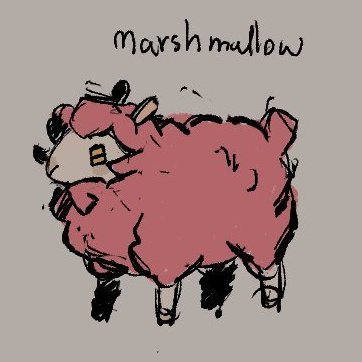

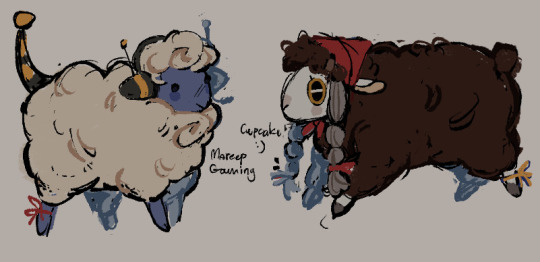
more youtubers/streamers need funny little sheep mascots and characters that appear here and there they r so fun to draw and stylize (thank you daniel rtgame)
359 notes
·
View notes
Text
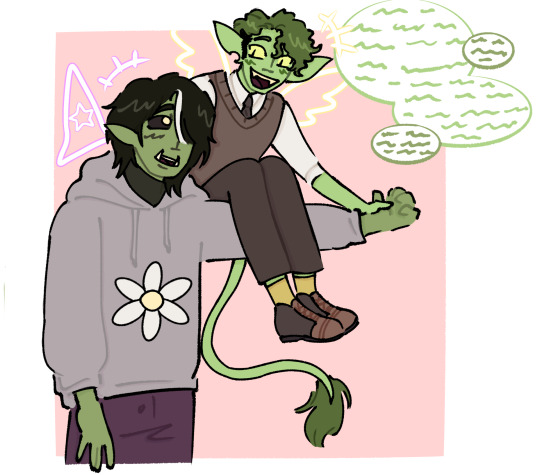
Underrated Duo within The Bad Kids…
No but actually the Gorgug and Riz interactions this season have been making me very happy they are so very sweet and the best friends ever,,, Enjoy this piece based on a very old drawing of them (which I will never share because it looks. bad. Haha)
609 notes
·
View notes
Text
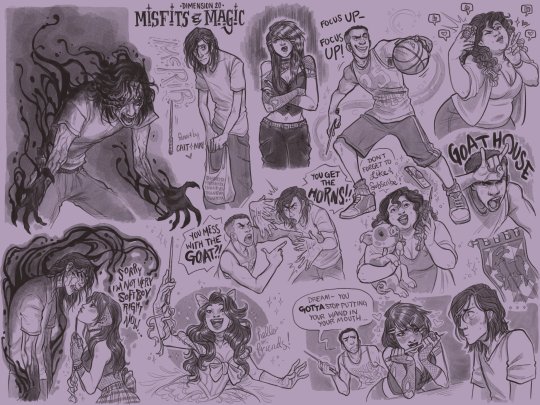
Welp.
I love them all desperately.
I remembered to timelapse this time if anyone's interested in my process ;D
1K notes
·
View notes
